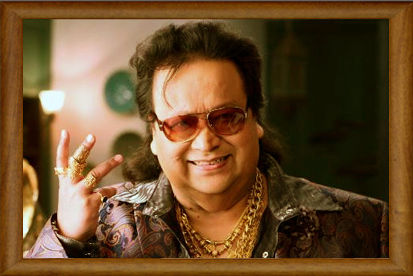Javed Akhtar once said, "Have you ever heard a Bappi Lahiri song that is dull? His songs are so bright." That sums up the Bappi style. Even the pathos-laden melodies ('Nanha Sa Panchhi Re Tu..’, ‘Naina Yeh Barse..’) always have a certain spark in them. Bappi Lahiri is one composer who had the basic credentials but chose to go commercial in most of the assignments (400 films in approximately 28 years) that he took up. He sidelined old favourites like Gauhar Kanpuri, Farukh Kaiser and Shaily Shailendra once he hit big time, but today he is reduced to working with small or unknown names.
Known as the Disco King at his peak, the poor man is generally considered the master plagiarist even though as he says, "Everyone has plagiarized right from the veterans. But I have done it from famous sources, there is no pretence'. The composer is always bedecked with jewellery, which includes pendants of religious or astrological value. His worst critics concede that he was always a trendsetter and that he has his own identifiable compositional and orchestral style, which Bappi says is only possible when you have a strong musical base. Considered a poor clone of
R.D.Burman, he denies it and says that
S.D.Burman and
Madan Mohan are his inspirations. His favourite singers have always been
Kishore Kumar and the Mangeshkar sisters and he has always sung a lot.
Bappi Lahiri is the son of veteran classical singer Bansari and musician and singer Aparesh Lahiri. A child prodigy, he began to play the tabla from the age of three and developed his liking for rhythm. He learnt classical music from his parents and made his debut as a music director at the age of 14 with Daadu, a Bengali film released in 1972. His relatives from his mother's side include singer Kishore Kumar and the S. Mukerji clan. Shomu Mukherji, S. Mukherji' son, gave him his Hindi break in Naha Shikari (1973). In the same year, he composed the background score for the songless B. R. Ishara film Charitra. Followed Bazar Band Karo, a B. R. Ishara non-starter in 1974. In 1975, Bappi Lahiri got his first brush with fame as the music director of the Tahir Husain multi-star hit Zakhmee, in which he sang his first song, ‘Nothing Is Impossible..’ with Mohammed Rafi and Kishore Kumar. In the same year, his songs from Chalte Chalte, whose audio was released almost simultaneously, became a rage, especially the title song, ‘Kabhi Alwida Na Kehna..‘ sung by Kishore Kumar, ‘Jaana Kahaan Hai..’ sung by Bappi himself with Sulakshana Pandit and ‘Pyar Mein Kabhi Kabhi..’ by Lata Mangeshkar and Shailendra Singh. For the rest of the '70s, Bappi had a spell of bad luck, His big films (Khoon Ki Pukar, Lahu Ke Do Rang, Paapi) did not have hit music and his small films did, like Aap Ki Khatir , Toote Khilone, Dilsey Miley Dil, College Girl, Surakshaa and Ehsaas. In the '80s, Bappi's fortunes took a turn for the better, albeit with the help of straight lifts like ‘Hari Om Hari..’ (Pyaara Dushmun). ‘Mere Jaisi Haseena Ka Dil..’ (Armaan) and disco numbers like ‘Rambha Ho..’ (Armaan), ‘Disco Station..' (Hathkadi) and ‘I Am A Disco Dancer..’ and ‘Koi Yahan Naache Naache..’ (Disco Dancer). But his real breakthrough into the big league came with Prakash Mehra's Amitabh Bachchan 1982 super-hit Namak Halaal and the first of the dozen Padmalaya waist-wrenchers from Chennai, Himmatwala (1983). Aided by the corny lyrics from Anjaan and Indeewar, Jeetendra's gyrations with Southern belles and Mithun Chakraborty's pelvic jerks, Bappi became a double trendsetter (disco and the Southern 'vulgar' music) and annihilated all the older composers, except for Laxmikant - Pyarelal. "After the first lot of such films, I was branded as a composer of fast music", says Bappi. "My mother did not like it, but I had to convince her. After all, I am like a shopkeeper who has to sell what the people want from his shop". To be fair, Bappi also tried the Indian and even classical stuff in scores like Aitbaar, Sheeshay Ka Ghar, Salma and occasional songs in Pyaas and even Bomb Blast in the '90s, but it was no go. Among the singers he has introduced or given major break to are Sharon Prabhakar, S.Janaki of the South, Alisha Chinai, Hema Sardesai, Vijay Benedict, his own daughter Rema and Kavita Paudwal. He also has believed in doing albums - both Hindi and Western along with his films long before the current trend of composers cutting private albums. His Superuna with Runa Laila was a super-seller in 1983, and his hit single ‘Habiba’ made him the first Asian to enter the Billboard Ratings and earn compliments from major music journals abroad in the '80s too. He has also composed the background score for the English film made by B.Subhash, Divine Lovers. He has also been a producer and his latest film, Love Story Deewano Ki (earlier titled Love Story' 98) is still to find buyers.
He is currently relying on small budget films but still he manages to be in the headlines with his jazzy humbers.

